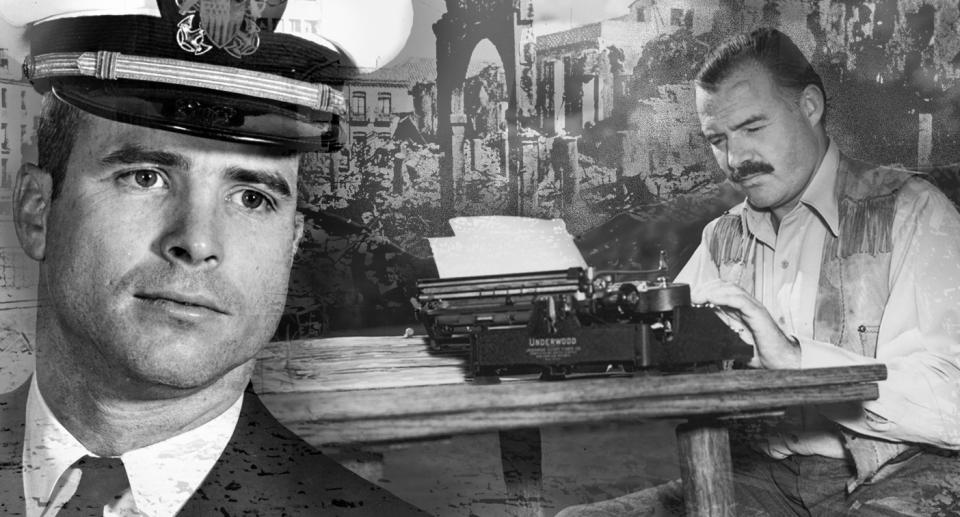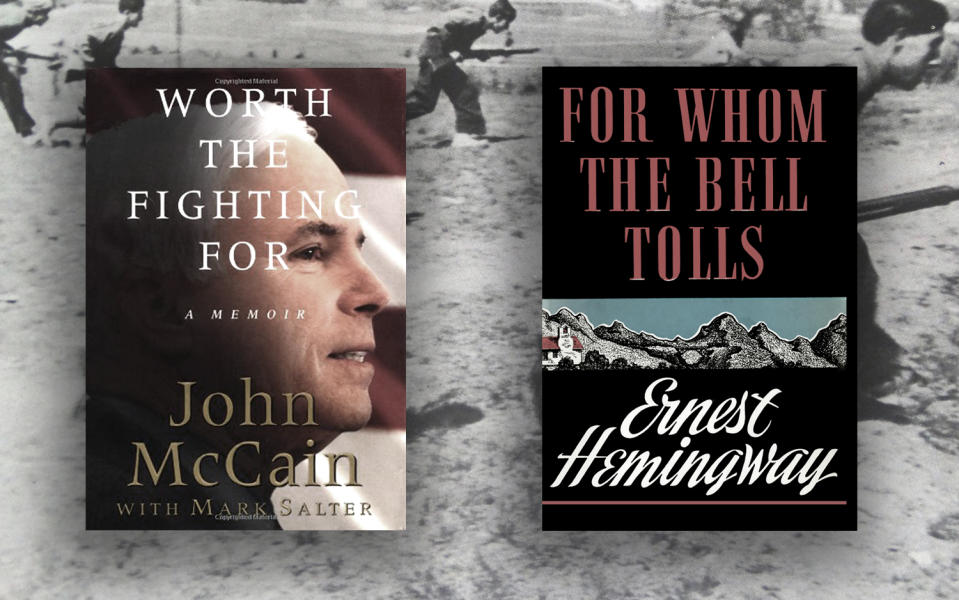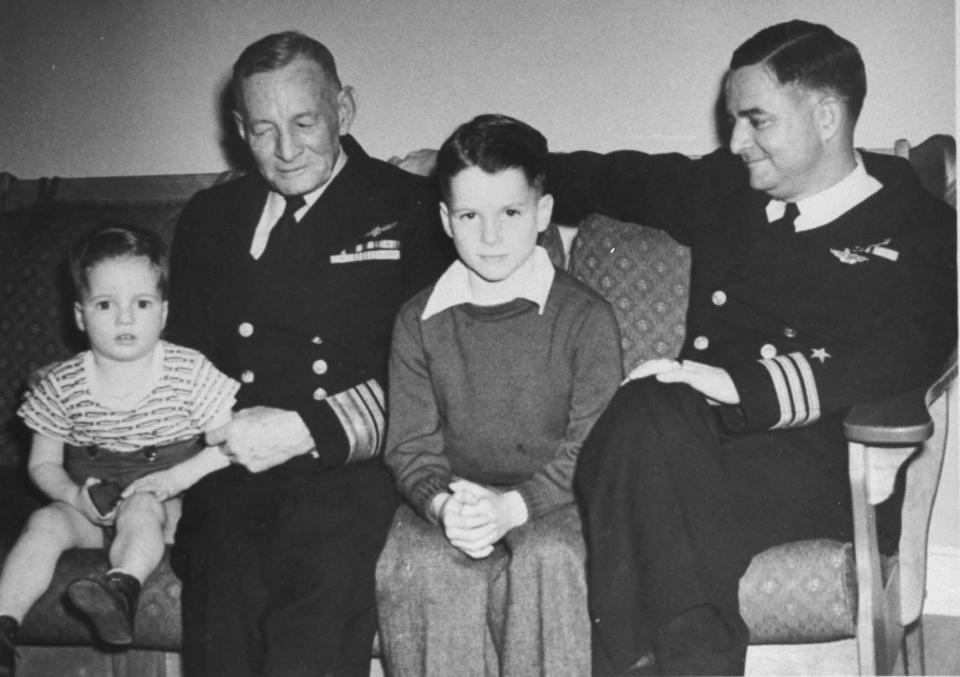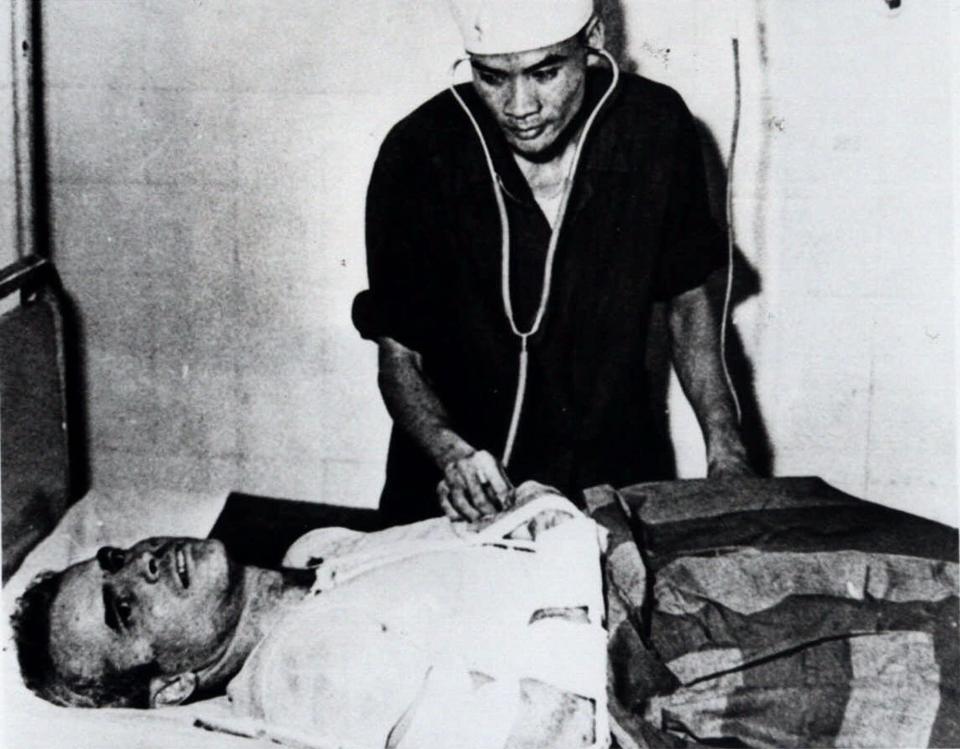The bell tolls for John McCain: How Hemingway's antifascist hero shaped the man
The protagonist of Ernest Hemingway’s novel “For Whom the Bell Tolls” is Robert Jordan, a young American who left his job to fight with the Republican side, against the Nazi-supported Nationalists, in the Spanish Civil War. He never loses sight of his objective — the demolition of a bridge — despite doubts about whether the mission is necessary or even possible. He hates fascism and feels a profound sense of duty to oppose it.
John McCain, who died Saturday in Arizona after a 14-month fight against brain cancer, always said this 1940 novel about guerrilla warfare was his favorite and that its hero was a source of inspiration throughout his life — even as a prisoner of war in Vietnam.
The name of McCain’s 2002 book, “Worth the Fighting For,” comes from a moment when Jordan thinks back on his life and confronts his own mortality: “The world is a fine place and worth fighting for and I hate very much to leave it.”
McCain begins “Worth the Fighting For” by explaining how he first came to read “For Whom the Bell Tolls.” At the age of 12, he found two four-leaf clovers on the front yard of his parents’ home in Alexandria, Va., and rushed to his father’s study to grab a book he could press his new good-luck charms in. By chance, he opened the book to the tenth chapter and a few tense lines illustrating the inhumanity of war caught his attention, casting an “immediate spell” on him.

He wound up reading the book as quickly as he could, and many more times since. His “romantic notions of courage and love” took flight in this tale of heroism, sacrifice and redemption. He aspired to have Robert Jordan’s “courage and nobility” — confident he would one day. McCain credited “For Whom the Bell Tolls” with teaching him how a real hero lives and dies, as well as how and why to be brave.
“For a long time, Robert Jordan was the man I admired above almost all others in life and fiction. He was brave, dedicated, capable, selfless, possessed in abundance that essence of courage that Hemingway described as grace under pressure, a man who would risk his life but never his honor,” McCain wrote.
“He was and remains to my mind a hero for the twentieth century, my century, the century when McCains went to war on ships and claimed our place in the great clashes among rival ideologies, fascism, communism, and self-determination, that made the age as memorable for its violence as for its progress.”
In its time, “For Whom the Bell Tolls” achieved widespread critical and commercial success and was adapted as a film starring Gary Cooper and Ingrid Bergman that was also a hit. It’s still regarded as one of Hemingway’s best novels.

McCain’s life story is well known. Before entering politics as a congressman from Arizona, he followed the family tradition of serving in the U.S. Navy. During the Vietnam War, his Douglas A-4 Skyhawk was shot down over Hanoi, and he was captured and held as a prisoner of war for five and a half years, enduring torture and a long period of solitary confinement. Because his father was a high-ranking U.S. officer, the North Vietnam government offered to release McCain for propaganda purposes, but he refused this unless every other American prisoner captured before him was also released.
Despite obvious differences, there is a common thread running through McCain and Jordan’s stories. Both were Americans who dedicated their lives to defending democratic governments in another country. In both cases, they were on the losing side. Spain fell to the fascists, and Francisco Franco ruled until his death in 1975. South Vietnam and North Vietnam were reunified under Communist rule.
Louise Barnett, an author and professor emerita of American Studies at Rutgers University, said it’s no mystery why Jordan would have been a compelling figure to McCain. He’s an ordinary man with a sedentary job and no particular military skills who was motivated to join a cause he believed to be just.
“It gives the lie to the idea that Hemingway is always writing about macho figures. He actually isn’t,” she said. “These people are very educated and literate — not making their living punching people out. Robert Jordan goes to Spain because he’s motivated by an ideal: democracy fighting against fascism.”

David Wyatt, a professor of English at the University of Maryland and author of “Hemingway, Style, and the Art of Emotion,” similarly described Jordan and McCain as idealists from military families who were wounded fighting in someone else’s war — driven by an idea.
“Spain, like Vietnam, was a very confusing place. There were lots of factions on both sides,” Wyatt told Yahoo News. “Robert is fighting for the republic and against the fascists, who eventually win. … McCain fought against the communist North and on behalf of a very corrupt regime in the South.”
Heroic stories of World War II soldiers liberating Europe from Nazism were a driving influence for a generation of Americans who volunteered to serve in the first few years of Vietnam. Before controversies about presidents escalating the war for political motives, despite doubting whether it was winnable, the American people were far less cynical about believing the U.S. government. Many in the American military saw their role in Vietnam as analogous to the French soldiers’ in the American Revolution — helping an incipient democracy shake off the shackles of tyranny — and were shocked to discover that many Vietnamese thought they were closer to the British: occupying a foreign land that was fighting for independence. Back home, disagreements about the war contributed to a massive cultural divide that’s still felt today.
Hemingway committed suicide in 1961, the year John F. Kennedy was inaugurated, and never got to see that decade’s cultural revolution forever change the relationship between Americans and their government. The heroes of Hemingway’s work are the products of a bygone era. It had greater influence on young men in his lifetime than now. With the passing of people like McCain, is this vision of heroism inspired by Hemingway’s protagonists on its way out?
Barnett said the type of hero embodied by Jordan is a relic of a previous era. She said Americans today tend not to embrace large ideals the way earlier generations did, or see any cause worth fighting for, the way Jordan had.

“Of course, McCain comes from a different time period,” she said. “We’re really living in an entirely different world today from the one Hemingway created Robert Jordan in and the one in which so many historic people did what Robert Jordan did.”
Since Hemingway’s time, traditional gender roles have also been challenged and reconsidered.
David Alworth, a humanities professor at Harvard University, said Jordan’s masculinity is an interesting topic: His combination of physical and mental strength with sensitivity allows him to love deeply in relationships and forge meaningful bonds with other men.
“While Jordan strives to live by the same rules of self-control, acceptance, and dispassion that we often see in Hemingway’s heroes, he is finally a man who feels the weight of his most difficult decisions and the heartbreak of each sacrifice,” Alworth told Yahoo News.
McCain, born in 1936, was a member of the Silent Generation, the cohort between the G.I. Generation and the baby boomers. They are typically described as traditional, hardworking and respectful of authority.
As a modernist, however, Hemingway understood that people were losing faith in institutions like churches and the government throughout the 20th century.

“That’s why you get the code hero,” Barnett said. “The small group of insiders who are aware of the way things really are, whereas the vast majority of people are clueless. I think he’s right about that.”
As seen elsewhere in Hemingway’s work, actually stepping into a war zone tends to disabuse people of romantic ideas about war pretty quickly. Jordan’s experiences could have turned him pessimistic, like Hemingway himself, but throughout the novel he keeps his belief that his side deserves to win. Hemingway and Jordan remained committed to the Republican cause in Spain.
“He’s very grounded and focused. He knows what he’s doing there,” Barnett said. “And ultimately, he’s willing to die for it. Really, he’s a hero.”
“The great thing about ‘For Whom the Bell Tolls’ is that it is so rich and complex that readers, like McCain, can find what they need there,” Wyatt said.
Alworth said Jordan is honorable, decent, fights for “the everyman” and has a keen sense of his place within the larger war effort.
“He carries out his mission in the face of mishaps, misfortune, and lost love, risking and ultimately sacrificing his own life for the greater social good, and it is this sense of responsibility to others that probably appeals to McCain, the ‘maverick’ who champions bipartisanship,” Alworth said.

In his final memoir, 2018’s “The Restless Wave,” McCain described himself as a proud democratic internationalist. He argued that the U.S. has a special responsibility to champion human rights in all places and for all people. To make his case, once again, he invoked the Hemingway masterpiece.
“I took from Hemingway’s ‘For Whom the Bell Tolls’ that defending the dignity of others is never a lost cause whether you succeed or not,” he wrote.
During the Spanish Civil War and Vietnam, Americans would debate whether the conflicts were of much consequence to people living beyond their borders. Hemingway’s book title comes from John Donne’s “Meditation XVII” on the interconnectedness of humankind, suggesting that the Spanish Civil War matters to everyone — not only Spaniards. The poem reads in part, “No man is an island, entire of itself; every man is a piece of the continent, a part of the main.”
McCain said he thrilled to the Donne poem’s exhortation to be involved in the struggles of mankind. “The bell tolls for me,” he wrote. “I knew it would. So I tried, as best I could, to stay ‘a part of the main.’”
_____
Read more from Yahoo News:



